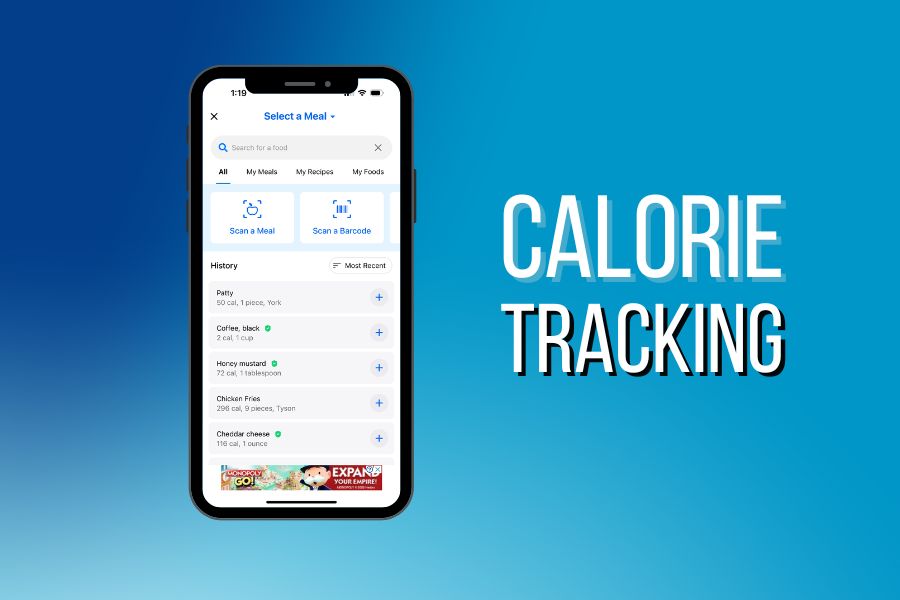Have you ever wondered why everyone’s suddenly talking about tracking calories?
It is because it works!
There’s a famous saying that “What gets measured gets managed” and this is never more true than your own body.
Of course, everyone knows that calories are important and everyone has compared labels, but until you track your calories you are mostly flying blind.
Tracking your calories helps you make smarter daily eating decisions.
It also opens your eyes to the high-calorie foods that you might have once assumed were healthy.
And most importantly calorie tracking helps you to make overall health changes to reach your health and fitness goals.
Benefits of Tracking Calories

Awareness and Accountability
Imagine having a little health buddy on your shoulder, gently nudging you to be mindful of what you eat.
That’s the awareness calorie tracking brings.
It keeps you accountable like a health-conscious friend cheering you on.
Weight Management
Whether you’re looking to shed a few pounds, change your body composition, maintain your weight, or bulk up those muscles, tracking calories puts you in control.
It’s like having a roadmap to reach your destination.
Nutrient Distribution
Your body loves balance, and so does calorie tracking.
It helps you ensure you’re getting the right mix of proteins, carbs, and fats – the superheroes of a well-rounded diet.
Identifying Patterns and Adjustments
Ever notice you eat more when stressed? I know I do, and it drives me crazy!
But calorie tracking unveils these patterns, helping you make tweaks and adjustments.
It’s like having a personal coach guiding you – without having to pay a coach.
You simply observe, identify, and adjust based on your real-world data.
Because of this, I am able to identify my triggers and adjust accordingly.
Tools and Methods for Calorie Tracking

There are many great tools out there for calorie tracking.
Mobile Apps
My go-to for years has been MyFitnessPal.
Not only does it contain a huge database of all of the foods you are already eating with all their nutritional information, but MyFitnessPal will also track your weight and exercise.
Of course, there are plenty of other great calorie-tracking apps out there, but for me, MyFitnessPal fits the bill.
Food Journaling
Grab yourself a good old notebook or create a simple spreadsheet.
Write down everything you eat and drink throughout the day, along with the estimated portion sizes.
It’s a classic method that provides a tangible, visual record of your intake.
Calorie Counting Books
Before apps ruled the world, there were these handy little books that compiled the calorie content of various foods.
You can still find them in bookstores or online.
Flip through the pages and jot down your daily intake.
Tips for Effective Calorie Tracking
Set Realistic Goals
Don’t aim for superhero status right away.
Start small, set achievable goals, and build up.
I recommend that you simply start tracking and observing.
Once you’ve done that for a while you can decide the most realistic goal for your fitness journey.
To help set a realistic goal, please check out our Calorie Calculator.
Listen to Your Body
Your body has a language, and it’s time to tune in.
Calorie tracking is a tool, not a dictator.
Listen to your body’s hunger and fullness cues.
Be Consistent
Consistency is key.
It’s like watering a plant regularly – you get healthier results when you stay on track.
Find a time in which you can consistently enter your calories.
For me, I find it best to do it first thing in the morning, I enter everything I think I will eat and then I go in and modify throughout the day.
Don’t Beat Yourself Up
Even if you indulge and go way over your calorie goal for the day, I still recommend tracking those calories.
But don’t beat yourself up. You need to observe:
- Why did you go overboard?
- What was the potential trigger?
- Is there ONE thing I can do differently tomorrow?
Food Scale
Invest in a good kitchen scale.
This is particularly useful for items that aren’t pre-packaged.
Weighing your food provides a more accurate representation of portion sizes, helping you track your calorie intake more precisely.
Conclusion
So, there you have it – the lowdown on why calorie tracking is your health’s BFF.
While I love MyFitnessPal, I think each person should find what works best for them.
It’s not about being perfect; it’s about reaching your health and fitness goals that matter!

Leave a Reply